北师大版(2019)选择性必修第一册 Unit 1 Relationships Topic Talk Lesson 1 Teachers 知识点讲练优质课件(共36张PPT)
文档属性
| 名称 | 北师大版(2019)选择性必修第一册 Unit 1 Relationships Topic Talk Lesson 1 Teachers 知识点讲练优质课件(共36张PPT) | 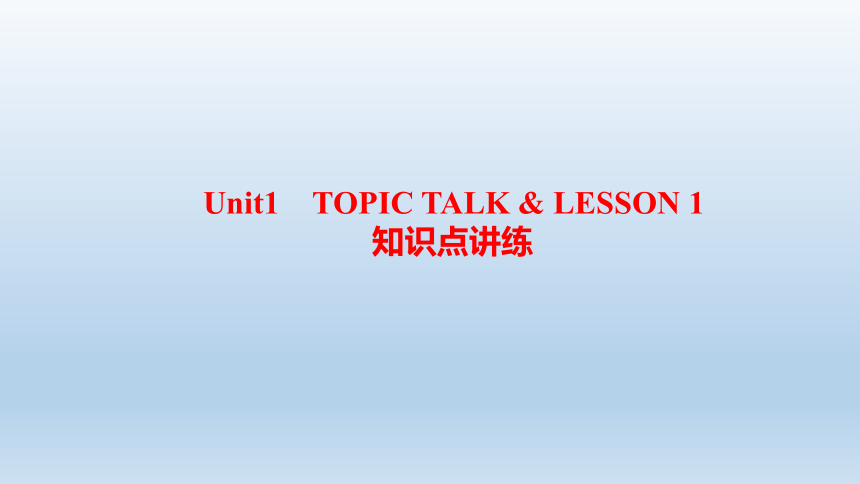 | |
| 格式 | pptx | ||
| 文件大小 | 1.2MB | ||
| 资源类型 | 教案 | ||
| 版本资源 | 北师大版(2019) | ||
| 科目 | 英语 | ||
| 更新时间 | 2023-03-15 17:57:41 | ||
图片预览

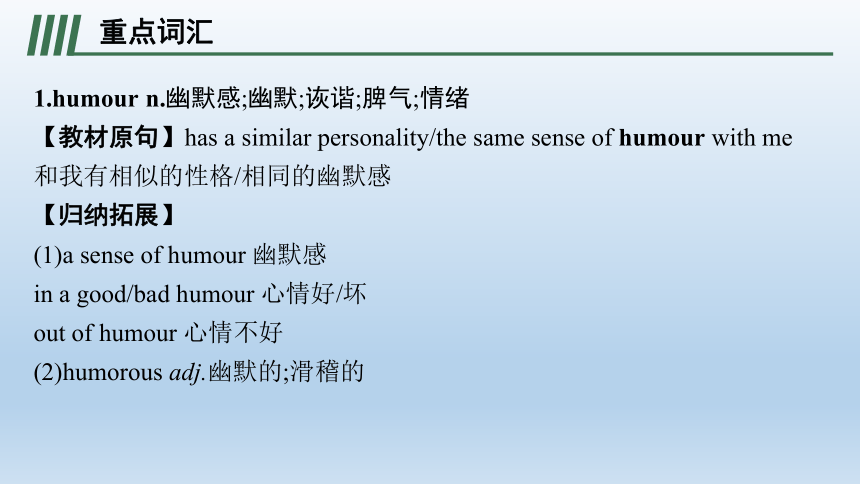
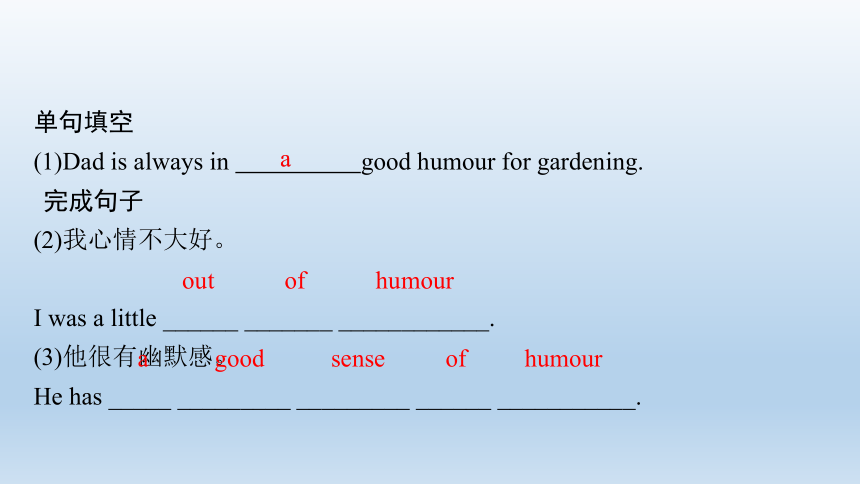
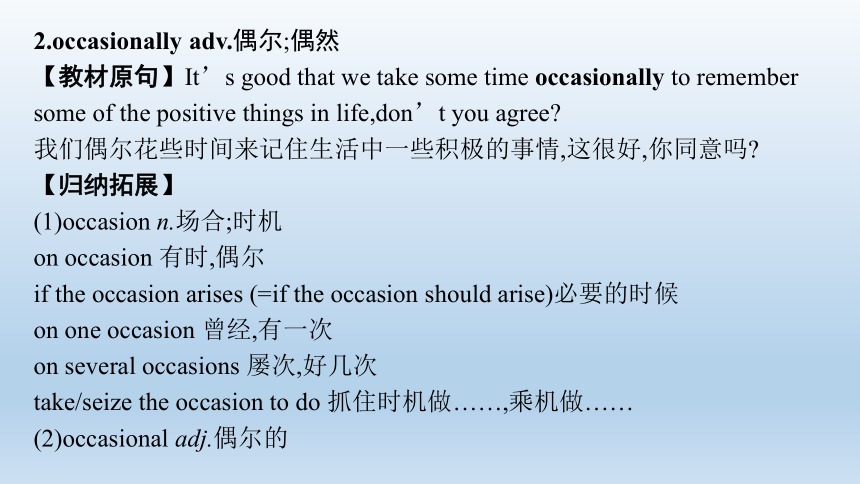
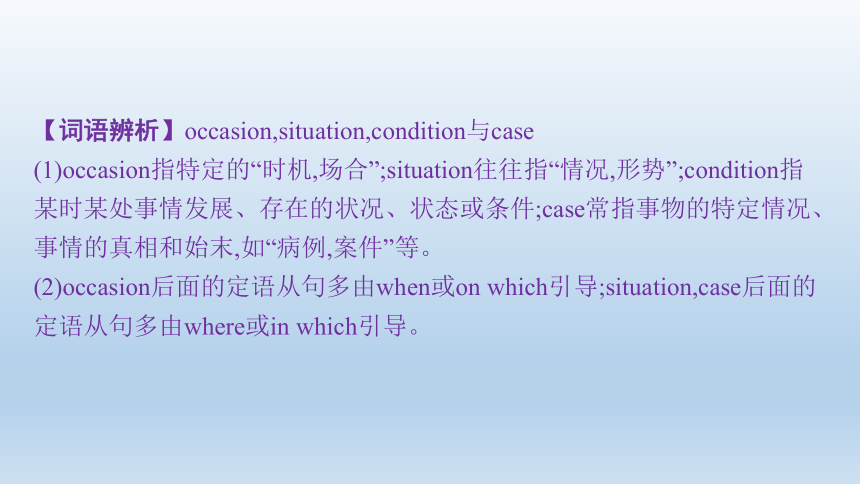
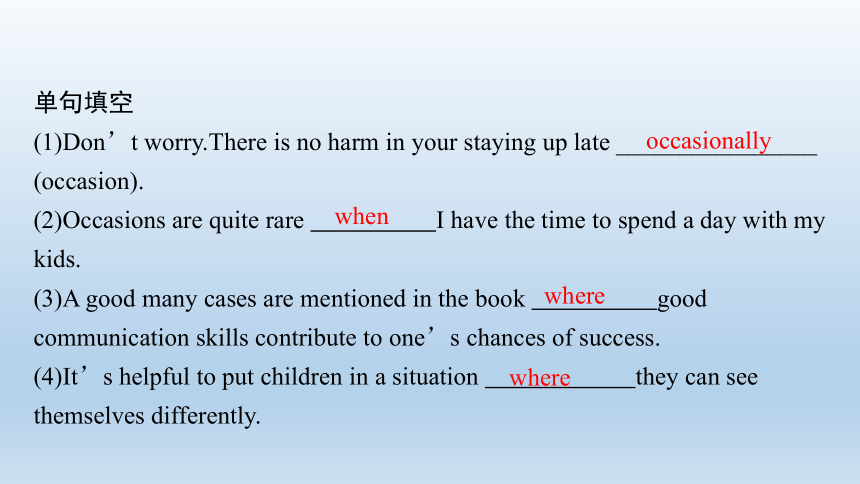
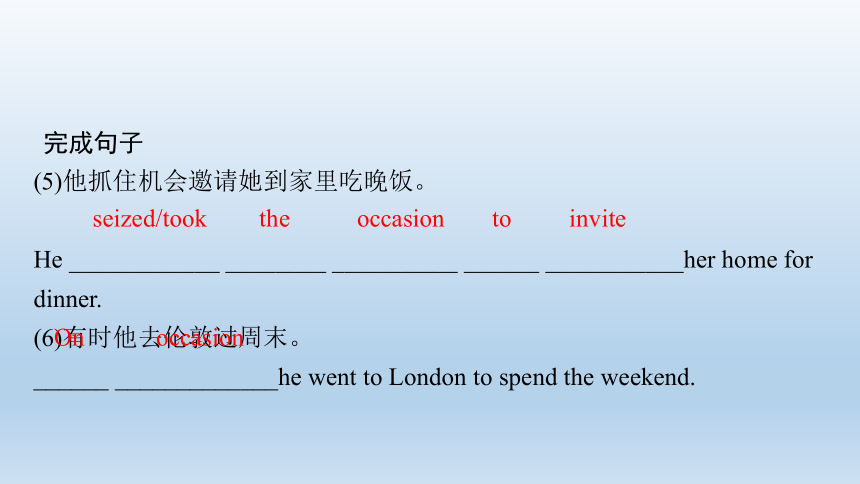
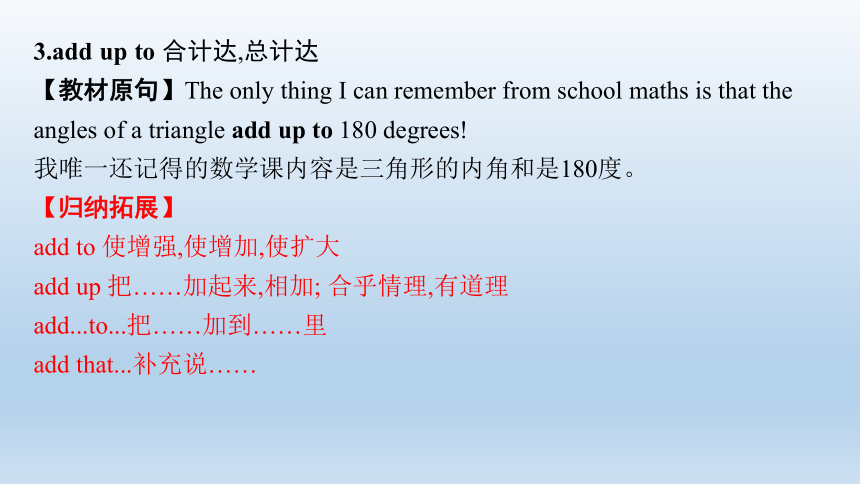
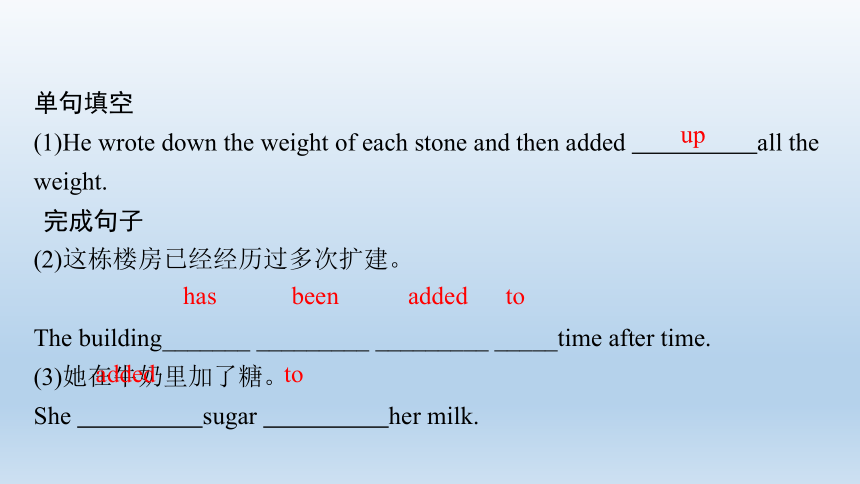
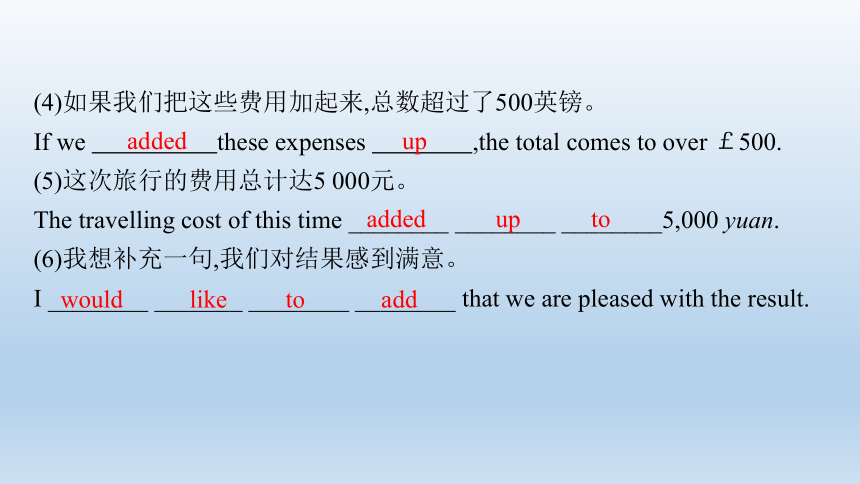
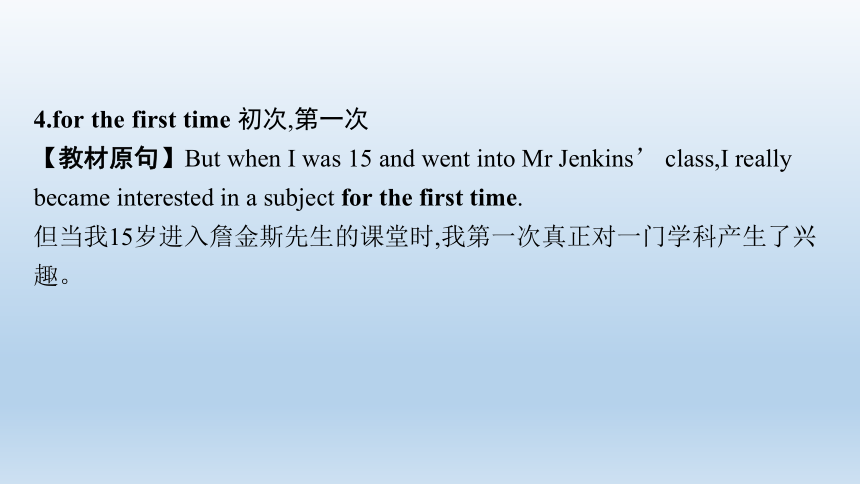
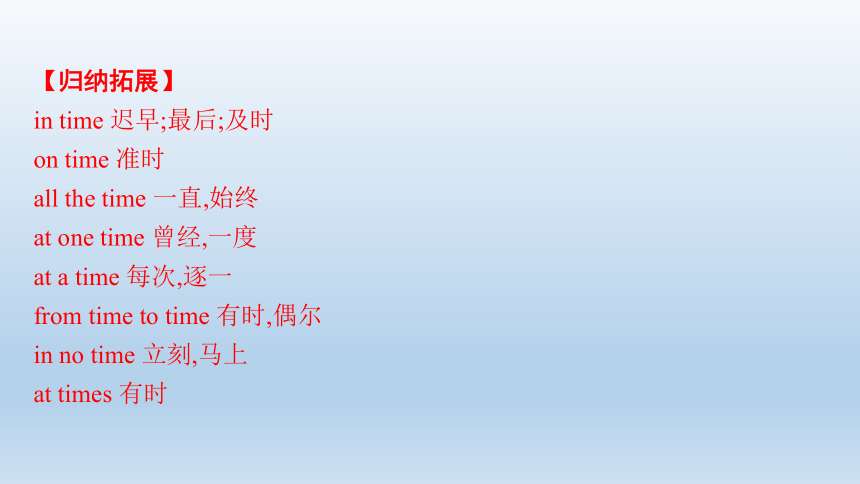
文档简介
(共36张PPT)
Unit1 TOPIC TALK & LESSON 1
知识点讲练
重点词汇
1.humour n.幽默感;幽默;诙谐;脾气;情绪
【教材原句】has a similar personality/the same sense of humour with me
和我有相似的性格/相同的幽默感
【归纳拓展】
(1)a sense of humour 幽默感
in a good/bad humour 心情好/坏
out of humour 心情不好
(2)humorous adj.幽默的;滑稽的
单句填空
(1)Dad is always in good humour for gardening.
完成句子
(2)我心情不大好。
I was a little ______ _______ ____________.
(3)他很有幽默感。
He has _____ _________ _________ ______ ___________.
a
out of humour
a good sense of humour
2.occasionally adv.偶尔;偶然
【教材原句】It’s good that we take some time occasionally to remember some of the positive things in life,don’t you agree
我们偶尔花些时间来记住生活中一些积极的事情,这很好,你同意吗
【归纳拓展】
(1)occasion n.场合;时机
on occasion 有时,偶尔
if the occasion arises (=if the occasion should arise)必要的时候
on one occasion 曾经,有一次
on several occasions 屡次,好几次
take/seize the occasion to do 抓住时机做……,乘机做……
(2)occasional adj.偶尔的
【词语辨析】occasion,situation,condition与case
(1)occasion指特定的“时机,场合”;situation往往指“情况,形势”;condition指某时某处事情发展、存在的状况、状态或条件;case常指事物的特定情况、事情的真相和始末,如“病例,案件”等。
(2)occasion后面的定语从句多由when或on which引导;situation,case后面的定语从句多由where或in which引导。
单句填空
(1)Don’t worry.There is no harm in your staying up late ________________ (occasion).
(2)Occasions are quite rare I have the time to spend a day with my kids.
(3)A good many cases are mentioned in the book good communication skills contribute to one’s chances of success.
(4)It’s helpful to put children in a situation they can see themselves differently.
occasionally
when
where
where
完成句子
(5)他抓住机会邀请她到家里吃晚饭。
He ____________ ________ __________ ______ ___________her home for dinner.
(6)有时他去伦敦过周末。
______ _____________he went to London to spend the weekend.
seized/took the occasion to invite
On occasion
3.add up to 合计达,总计达
【教材原句】The only thing I can remember from school maths is that the angles of a triangle add up to 180 degrees!
我唯一还记得的数学课内容是三角形的内角和是180度。
【归纳拓展】
add to 使增强,使增加,使扩大
add up 把……加起来,相加; 合乎情理,有道理
add...to...把……加到……里
add that...补充说……
单句填空
(1)He wrote down the weight of each stone and then added all the weight.
完成句子
(2)这栋楼房已经经历过多次扩建。
The building_______ _________ _________ _____time after time.
(3)她在牛奶里加了糖。
She sugar her milk.
up
has been added to
added
to
(4)如果我们把这些费用加起来,总数超过了500英镑。
If we these expenses ,the total comes to over £500.
(5)这次旅行的费用总计达5 000元。
The travelling cost of this time ________ ________ ________5,000 yuan.
(6)我想补充一句,我们对结果感到满意。
I ________ _______ ________ ________ that we are pleased with the result.
added
up
added up to
would like to add
4.for the first time 初次,第一次
【教材原句】But when I was 15 and went into Mr Jenkins’ class,I really became interested in a subject for the first time.
但当我15岁进入詹金斯先生的课堂时,我第一次真正对一门学科产生了兴趣。
【归纳拓展】
in time 迟早;最后;及时
on time 准时
all the time 一直,始终
at one time 曾经,一度
at a time 每次,逐一
from time to time 有时,偶尔
in no time 立刻,马上
at times 有时
用time的相关短语填空
(1)If you keep on,you’ll succeed .
(2) ,half the land on the earth’s surface was covered by the forest.
(3) ,I failed in an English exam,though English had been my favourite.
in time
At one time
For the first time
一句多译
他第二次在物理考试中得满分。
→(4) that he full marks in the physics exam.
→(5)It is the second time him full marks in the physics exam.
→(6)He has got full marks in the physics exam .
It/This/That is the second time
has got
for
to get
for the second time
5.used to 过去经常,曾经
【教材原句】He used to explain things which seemed difficult with lots of practical examples and in simple language.
他过去常常用大量的实例和简单的语言来解释那些看似困难的事情。
【归纳拓展】
be/get/become used to 习惯于……
be/get accustomed to 习惯于
be used to do sth 被用来做某事
be used as...被用作……
【词语辨析】used to,be/get/become used to,be/get accustomed to,be used to do sth
(1)used to“过去常常”,指的是过去的习惯性动作,目的在于与现在形成对照。其中to是不定式符号,后面跟动词原形。
(2)be/get/become used to“习惯于”,to是介词,后跟名词、代词或动词-ing形式作宾语。be used to表示状态,而get/become used to则表示由“不习惯”到“习惯于”的过程,意思是“(变得)习惯于,开始习惯于”。
(3)be/get accustomed to也可表示“习惯于”,其中to是介词,后接名词、代词或动词-ing形式等作宾语。
(4)be used to do sth“被用来做某事”,实际上是动词use的被动语态,to是不定式符号。
单句填空
(1)Some people are really not used to (use) credit cards.
完成句子
(2)他过去常常在网上玩游戏,但是现在他已经戒掉了这个习惯,全身心地投入到学习中去了。
He _______ _______ __________games on the Internet,but now he has given up the addiction and put his heart into studies.
(3)我已经变得习惯于在喧闹而刺激的房间里工作。
I’ve working in the room of noise and excitement.
using
used to play
got/become used to
6.practical adj.实际的;实践的;切实可行的
【教材原句】He used to explain things which seemed difficult with lots of practical examples and in simple language.
他过去常常用大量的实例和简单的语言来解释看似困难的事情。
【归纳拓展】
(1)for (all) practical purposes 实际上,事实上
(2)practise v.练习,训练
practice v.练习,训练
n.练习,习惯,惯例;实践
practise/practice doing sth 练习做某事
(3)impractical adj.不切实际的;不实用的
单句填空
(1)The sale was supposed to last for a week,but all practical purposes it’s over.
(2)To be a good football player,you need to practise (play) football every day.
(3)It’s common practice to exchange gifts with friends and relatives at Christmas.
(4)Many people spoke highly of the plan at the meeting,but personally,I don’t think it is of much (practice) use.
for
playing
a
practical
完成句子
(5)理论是以实践为基础的,反过来又为实践服务。
Theory is based on practice and _____ ________ __________ ___________.
(6)摆脱过时且不实用的陈旧的传统观念对我们来说是重要的。
It is important for us to break away from the old traditional ideas which are out of date _______ _______________.
in turn serves practice
and impractical
7.pour v.灌,注,倒;倾泻;不断流动;蜂拥而来
【教材原句】I remember that he let me pour some fuel into the rocket,and then another student lit a match to set it off.
我记得他让我往火箭里倒了一些燃料,然后另一个学生划着了一根火柴把它点燃。
【归纳拓展】
pour down 向下倾注;流下
pour in 大量地涌进来;倒入,使涌入
pour into 投入(倒)……于某物;不断地或大量地流进或涌进
pour out 倒出;倾诉;倾吐
单句填空
(1)We listened to him pour his troubles.
(2)Letters of complaint continue to pour .
(3)Thousands of people poured the stadium to watch the football match.
out
in
into
8.lack v.缺乏,不足 n.缺乏;无
【教材原句】The problem was that I lacked confidence in myself.
问题是我对自己缺乏信心。
【归纳拓展】
lack of sth缺乏某物
lack for sth 需要某物
lack for nothing 一无所缺
be lacking in 缺乏(品质、特点等)
for lack of 因缺乏
have no lack of 不缺乏
be short of 缺少
单句填空
(1)Later,he worked in Africa,where many people suffered from blindness
lack of proper treatment.
完成句子
(2)我们没有力气继续前行,于是就躺在地上睡一会儿。
As we the strength to go any farther,we lay on the ground to have a sleep.
(3)缺少雨水导致了严重的粮食短缺。
_____ ________ ______ _________led to the serious lack of food.
for
lacked
The lack of rain
(4)工程因资金匮乏只得被放弃。
The project had to be given up ______ ________ _______money.
(5)这姑娘好像完全没有勇气跟老板说不。
The girl seems to be entirely _____________________ courage to say no to the boss.
(6)毕业后他申请了一份又一份工作,但都因为缺乏经验而被拒绝。
He applied for job after job after graduation,but was always rejected
______ ________ ________ previous experience.
for lack of
short of/lacking in
for lack of
9.drag v.拖,拉 n.拖;拉;累赘;阻力
【教材原句】The first day he walked into my class,he was dragging his schoolbag behind him and looking bored,but as soon as I set up an experiment to show how the human stomach works using acid and an onion,he gave me his full attention.
第一天,他走进我的课堂,身后拖着书包,看起来很厌烦。但是,当我开始做一个实验,利用酸和洋葱来展示人类的胃是如何工作的时候,他就全神贯注地听我讲了。
【归纳拓展】
drag sb down 使某人沮丧;使某人地位下降
drag in 插入讨论中
drag on 拖延
drag one’s feet 拖着脚走,迟缓误事,拖拉,不合作
drag out 使拖延,延长
drag up 把……拉扯大;重新提起;翻……的旧账
单句填空
(1)Let’s not drag the discussion—we need to reach a decision.
完成句子
(2)看起来那像是个会拖延多年的大烂摊子。
That seems like a horrible mess that will _______ _______ ______ _______.
(3)用鼠标拖动图片,将其调整为新的尺寸。
Use your mouse to ______ _______ ___________ ______their new size.
out
drag on for years
drag the pictures to
10.access n.进入;接触的机会,通道 v.进入
【教材原句】The thing about being a teacher is that you have access to children’s minds when they are open and eager to learn.
作为一名教师,你可以在孩子们敞开心扉、渴望学习时了解他们的思想。
【归纳拓展】
(1)access to 进入……的通道
give access to接见; 准许进入
have/gain/get/obtain access to...有/获得……方法
(2)accessible adj.可接近的;可进入的;可使用的
be accessible to sb 某人可接近/可进入/可使用
单句填空
(1)The only access the building is across the road.
完成句子
(2)药品不应放在儿童容易拿到的地方。
Medicine should not be kept where it _____ ____________ ________
children.
(3)由于下雪,乡下的许多地方我们都去不了。
Because of the snow,many parts of the countryside are no longer ___________ ______us.
to
is accessible to
to
accessible
11.worthwhile adj.值得做的;重要的;有益的
【教材原句】If what I do as a teacher can help turn a child like Graham into such a successful adult,then I know what I’m doing is worthwhile.
如果我作为一名教师所做的可以帮助像格雷厄姆这样的孩子成为一个成功的成年人,那么我知道我所做的是值得的。
【归纳拓展】
(1)it is worthwhile to do/doing sth 值得做某事
(2)worth adj.值得的
be worth doing sth 值得做某事
(3)worthy adj.值得的
be worthy of sth 值得……的
be worthy to be done/of being done 值得被做
【词语辨析】worthwhile,worth与worthy
(1)worthwhile表“值得做的”,基本句式是it is worthwhile doing/to do sth。如:
It is worthwhile searching for his roots.
有必要查查他的底细。
(2)worth强调“某事值得做或表示物品的价值”,基本句式是sth be worth sth或sth be worth doing。
(3)worthy强调“应该得到(尊重、信任、表彰等)”,不表示价值。
基本句式是be worthy of sth,be worthy to be done或be worthy of being done。如:
His courage is worthy of high praise.
他的勇气值得高度赞扬。
(4)有时,相同的意思可以用以上三个词组成不同的表达。
The place of interest is worth a visit.
=The place of interest is worth visiting.
=The place of interest is worthy to be visited.
=The place of interest is worthy of a visit.
=The place of interest is worthy of being visited.
=It is worthwhile visiting the place of interest.
单句填空
(1) is really worthwhile to study the animals in Corbett.
完成句子
(2)你提的建议值得考虑。
The suggestion you have put forward is worthy of _________________ / .
(3)我在评论中回复了他,但我觉得这值得向我们所有的读者提及。
I answered him in a comment,but I think ______ ________ _____________to all of our readers.
It
consideration
being considered
it’s worth mentioning
(4)那座教堂是那些古老壮观的英国建筑物之一,值得去参观。
The church was one of those fine old English structures worthy _______________________________________.
(5)我认为花这么多时间来讨论这件事不值得。
I don’t think it to devote so much time to discussing the matter.
of a visit/to be visited/of being visited
worthwhile
Unit1 TOPIC TALK & LESSON 1
知识点讲练
重点词汇
1.humour n.幽默感;幽默;诙谐;脾气;情绪
【教材原句】has a similar personality/the same sense of humour with me
和我有相似的性格/相同的幽默感
【归纳拓展】
(1)a sense of humour 幽默感
in a good/bad humour 心情好/坏
out of humour 心情不好
(2)humorous adj.幽默的;滑稽的
单句填空
(1)Dad is always in good humour for gardening.
完成句子
(2)我心情不大好。
I was a little ______ _______ ____________.
(3)他很有幽默感。
He has _____ _________ _________ ______ ___________.
a
out of humour
a good sense of humour
2.occasionally adv.偶尔;偶然
【教材原句】It’s good that we take some time occasionally to remember some of the positive things in life,don’t you agree
我们偶尔花些时间来记住生活中一些积极的事情,这很好,你同意吗
【归纳拓展】
(1)occasion n.场合;时机
on occasion 有时,偶尔
if the occasion arises (=if the occasion should arise)必要的时候
on one occasion 曾经,有一次
on several occasions 屡次,好几次
take/seize the occasion to do 抓住时机做……,乘机做……
(2)occasional adj.偶尔的
【词语辨析】occasion,situation,condition与case
(1)occasion指特定的“时机,场合”;situation往往指“情况,形势”;condition指某时某处事情发展、存在的状况、状态或条件;case常指事物的特定情况、事情的真相和始末,如“病例,案件”等。
(2)occasion后面的定语从句多由when或on which引导;situation,case后面的定语从句多由where或in which引导。
单句填空
(1)Don’t worry.There is no harm in your staying up late ________________ (occasion).
(2)Occasions are quite rare I have the time to spend a day with my kids.
(3)A good many cases are mentioned in the book good communication skills contribute to one’s chances of success.
(4)It’s helpful to put children in a situation they can see themselves differently.
occasionally
when
where
where
完成句子
(5)他抓住机会邀请她到家里吃晚饭。
He ____________ ________ __________ ______ ___________her home for dinner.
(6)有时他去伦敦过周末。
______ _____________he went to London to spend the weekend.
seized/took the occasion to invite
On occasion
3.add up to 合计达,总计达
【教材原句】The only thing I can remember from school maths is that the angles of a triangle add up to 180 degrees!
我唯一还记得的数学课内容是三角形的内角和是180度。
【归纳拓展】
add to 使增强,使增加,使扩大
add up 把……加起来,相加; 合乎情理,有道理
add...to...把……加到……里
add that...补充说……
单句填空
(1)He wrote down the weight of each stone and then added all the weight.
完成句子
(2)这栋楼房已经经历过多次扩建。
The building_______ _________ _________ _____time after time.
(3)她在牛奶里加了糖。
She sugar her milk.
up
has been added to
added
to
(4)如果我们把这些费用加起来,总数超过了500英镑。
If we these expenses ,the total comes to over £500.
(5)这次旅行的费用总计达5 000元。
The travelling cost of this time ________ ________ ________5,000 yuan.
(6)我想补充一句,我们对结果感到满意。
I ________ _______ ________ ________ that we are pleased with the result.
added
up
added up to
would like to add
4.for the first time 初次,第一次
【教材原句】But when I was 15 and went into Mr Jenkins’ class,I really became interested in a subject for the first time.
但当我15岁进入詹金斯先生的课堂时,我第一次真正对一门学科产生了兴趣。
【归纳拓展】
in time 迟早;最后;及时
on time 准时
all the time 一直,始终
at one time 曾经,一度
at a time 每次,逐一
from time to time 有时,偶尔
in no time 立刻,马上
at times 有时
用time的相关短语填空
(1)If you keep on,you’ll succeed .
(2) ,half the land on the earth’s surface was covered by the forest.
(3) ,I failed in an English exam,though English had been my favourite.
in time
At one time
For the first time
一句多译
他第二次在物理考试中得满分。
→(4) that he full marks in the physics exam.
→(5)It is the second time him full marks in the physics exam.
→(6)He has got full marks in the physics exam .
It/This/That is the second time
has got
for
to get
for the second time
5.used to 过去经常,曾经
【教材原句】He used to explain things which seemed difficult with lots of practical examples and in simple language.
他过去常常用大量的实例和简单的语言来解释那些看似困难的事情。
【归纳拓展】
be/get/become used to 习惯于……
be/get accustomed to 习惯于
be used to do sth 被用来做某事
be used as...被用作……
【词语辨析】used to,be/get/become used to,be/get accustomed to,be used to do sth
(1)used to“过去常常”,指的是过去的习惯性动作,目的在于与现在形成对照。其中to是不定式符号,后面跟动词原形。
(2)be/get/become used to“习惯于”,to是介词,后跟名词、代词或动词-ing形式作宾语。be used to表示状态,而get/become used to则表示由“不习惯”到“习惯于”的过程,意思是“(变得)习惯于,开始习惯于”。
(3)be/get accustomed to也可表示“习惯于”,其中to是介词,后接名词、代词或动词-ing形式等作宾语。
(4)be used to do sth“被用来做某事”,实际上是动词use的被动语态,to是不定式符号。
单句填空
(1)Some people are really not used to (use) credit cards.
完成句子
(2)他过去常常在网上玩游戏,但是现在他已经戒掉了这个习惯,全身心地投入到学习中去了。
He _______ _______ __________games on the Internet,but now he has given up the addiction and put his heart into studies.
(3)我已经变得习惯于在喧闹而刺激的房间里工作。
I’ve working in the room of noise and excitement.
using
used to play
got/become used to
6.practical adj.实际的;实践的;切实可行的
【教材原句】He used to explain things which seemed difficult with lots of practical examples and in simple language.
他过去常常用大量的实例和简单的语言来解释看似困难的事情。
【归纳拓展】
(1)for (all) practical purposes 实际上,事实上
(2)practise v.练习,训练
practice v.练习,训练
n.练习,习惯,惯例;实践
practise/practice doing sth 练习做某事
(3)impractical adj.不切实际的;不实用的
单句填空
(1)The sale was supposed to last for a week,but all practical purposes it’s over.
(2)To be a good football player,you need to practise (play) football every day.
(3)It’s common practice to exchange gifts with friends and relatives at Christmas.
(4)Many people spoke highly of the plan at the meeting,but personally,I don’t think it is of much (practice) use.
for
playing
a
practical
完成句子
(5)理论是以实践为基础的,反过来又为实践服务。
Theory is based on practice and _____ ________ __________ ___________.
(6)摆脱过时且不实用的陈旧的传统观念对我们来说是重要的。
It is important for us to break away from the old traditional ideas which are out of date _______ _______________.
in turn serves practice
and impractical
7.pour v.灌,注,倒;倾泻;不断流动;蜂拥而来
【教材原句】I remember that he let me pour some fuel into the rocket,and then another student lit a match to set it off.
我记得他让我往火箭里倒了一些燃料,然后另一个学生划着了一根火柴把它点燃。
【归纳拓展】
pour down 向下倾注;流下
pour in 大量地涌进来;倒入,使涌入
pour into 投入(倒)……于某物;不断地或大量地流进或涌进
pour out 倒出;倾诉;倾吐
单句填空
(1)We listened to him pour his troubles.
(2)Letters of complaint continue to pour .
(3)Thousands of people poured the stadium to watch the football match.
out
in
into
8.lack v.缺乏,不足 n.缺乏;无
【教材原句】The problem was that I lacked confidence in myself.
问题是我对自己缺乏信心。
【归纳拓展】
lack of sth缺乏某物
lack for sth 需要某物
lack for nothing 一无所缺
be lacking in 缺乏(品质、特点等)
for lack of 因缺乏
have no lack of 不缺乏
be short of 缺少
单句填空
(1)Later,he worked in Africa,where many people suffered from blindness
lack of proper treatment.
完成句子
(2)我们没有力气继续前行,于是就躺在地上睡一会儿。
As we the strength to go any farther,we lay on the ground to have a sleep.
(3)缺少雨水导致了严重的粮食短缺。
_____ ________ ______ _________led to the serious lack of food.
for
lacked
The lack of rain
(4)工程因资金匮乏只得被放弃。
The project had to be given up ______ ________ _______money.
(5)这姑娘好像完全没有勇气跟老板说不。
The girl seems to be entirely _____________________ courage to say no to the boss.
(6)毕业后他申请了一份又一份工作,但都因为缺乏经验而被拒绝。
He applied for job after job after graduation,but was always rejected
______ ________ ________ previous experience.
for lack of
short of/lacking in
for lack of
9.drag v.拖,拉 n.拖;拉;累赘;阻力
【教材原句】The first day he walked into my class,he was dragging his schoolbag behind him and looking bored,but as soon as I set up an experiment to show how the human stomach works using acid and an onion,he gave me his full attention.
第一天,他走进我的课堂,身后拖着书包,看起来很厌烦。但是,当我开始做一个实验,利用酸和洋葱来展示人类的胃是如何工作的时候,他就全神贯注地听我讲了。
【归纳拓展】
drag sb down 使某人沮丧;使某人地位下降
drag in 插入讨论中
drag on 拖延
drag one’s feet 拖着脚走,迟缓误事,拖拉,不合作
drag out 使拖延,延长
drag up 把……拉扯大;重新提起;翻……的旧账
单句填空
(1)Let’s not drag the discussion—we need to reach a decision.
完成句子
(2)看起来那像是个会拖延多年的大烂摊子。
That seems like a horrible mess that will _______ _______ ______ _______.
(3)用鼠标拖动图片,将其调整为新的尺寸。
Use your mouse to ______ _______ ___________ ______their new size.
out
drag on for years
drag the pictures to
10.access n.进入;接触的机会,通道 v.进入
【教材原句】The thing about being a teacher is that you have access to children’s minds when they are open and eager to learn.
作为一名教师,你可以在孩子们敞开心扉、渴望学习时了解他们的思想。
【归纳拓展】
(1)access to 进入……的通道
give access to接见; 准许进入
have/gain/get/obtain access to...有/获得……方法
(2)accessible adj.可接近的;可进入的;可使用的
be accessible to sb 某人可接近/可进入/可使用
单句填空
(1)The only access the building is across the road.
完成句子
(2)药品不应放在儿童容易拿到的地方。
Medicine should not be kept where it _____ ____________ ________
children.
(3)由于下雪,乡下的许多地方我们都去不了。
Because of the snow,many parts of the countryside are no longer ___________ ______us.
to
is accessible to
to
accessible
11.worthwhile adj.值得做的;重要的;有益的
【教材原句】If what I do as a teacher can help turn a child like Graham into such a successful adult,then I know what I’m doing is worthwhile.
如果我作为一名教师所做的可以帮助像格雷厄姆这样的孩子成为一个成功的成年人,那么我知道我所做的是值得的。
【归纳拓展】
(1)it is worthwhile to do/doing sth 值得做某事
(2)worth adj.值得的
be worth doing sth 值得做某事
(3)worthy adj.值得的
be worthy of sth 值得……的
be worthy to be done/of being done 值得被做
【词语辨析】worthwhile,worth与worthy
(1)worthwhile表“值得做的”,基本句式是it is worthwhile doing/to do sth。如:
It is worthwhile searching for his roots.
有必要查查他的底细。
(2)worth强调“某事值得做或表示物品的价值”,基本句式是sth be worth sth或sth be worth doing。
(3)worthy强调“应该得到(尊重、信任、表彰等)”,不表示价值。
基本句式是be worthy of sth,be worthy to be done或be worthy of being done。如:
His courage is worthy of high praise.
他的勇气值得高度赞扬。
(4)有时,相同的意思可以用以上三个词组成不同的表达。
The place of interest is worth a visit.
=The place of interest is worth visiting.
=The place of interest is worthy to be visited.
=The place of interest is worthy of a visit.
=The place of interest is worthy of being visited.
=It is worthwhile visiting the place of interest.
单句填空
(1) is really worthwhile to study the animals in Corbett.
完成句子
(2)你提的建议值得考虑。
The suggestion you have put forward is worthy of _________________ / .
(3)我在评论中回复了他,但我觉得这值得向我们所有的读者提及。
I answered him in a comment,but I think ______ ________ _____________to all of our readers.
It
consideration
being considered
it’s worth mentioning
(4)那座教堂是那些古老壮观的英国建筑物之一,值得去参观。
The church was one of those fine old English structures worthy _______________________________________.
(5)我认为花这么多时间来讨论这件事不值得。
I don’t think it to devote so much time to discussing the matter.
of a visit/to be visited/of being visited
worthwhile
同课章节目录
- Unit 1 Relationshis
- Lesson 1 Teachers
- Lesson 2 How Do We Like Teachers’ Feedback?
- Lesson 3 So Close,Yet So Fa
- Unit 2 Success
- Lesson 1 Money vs Success
- Lesson 2 Top Five Secrets of Success
- Lesson 3 Getting to the Top
- Unit 3 Conservation
- Lesson 1 The Sixth Extinction
- Lesson 2 War on Plastic Packets
- Lesson 3 The Road to Destruction
